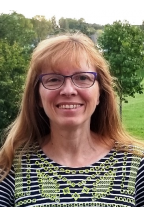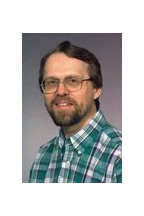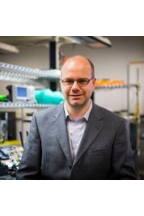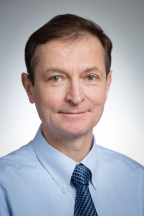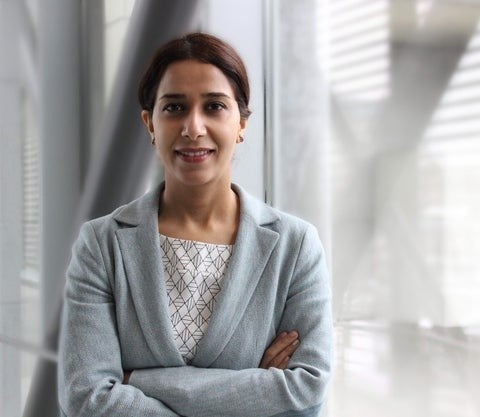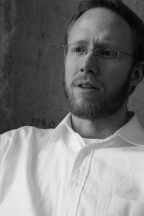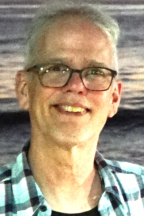Professor Information:
Kerstin Dautenhahn is a professor in the Department of Electrical and Computer Engineering at the University of Waterloo. She is a Canada 150 Research Chair in Intelligent Robotics and is cross-appointed to the David R. Cheriton School of Computer Science, the Department of Mechanical and Mechatronics Engineering, and the Department of Systems Design Engineering at University of Waterloo. She is Visiting Professor at the University of Hertfordshire, UK. At Waterloo she is the Director of the Social and Intelligent Robotics Research Laboratory (SIRRL)).
- Human-robot Interaction, Social Robotics, Robot-Assisted Therapy, Robot-mediated Instruction, Assistive Robotics, Artificial Intelligence, Artificial Life
James Barby is an Associate Professor in the Department of Electrical and Computer Engineering at the University of Waterloo.
His research interests include mixed-mode and behavioural models of devices, complex analog or mixed-mode circuits, simulation of switched networks for communications and power electronics, analysis methods and models for digital, analog and mixed-signal VLSI systems, and optimal fit numerical approximations of transistor models.
- Mixed-mode and behavioural models of devices, complex analog or mixed-mode circuits, Simulation of switched networks, analog and mixed-signal VLSI systems, Optimal fit numerical approximations of transistor, Circuits Design & VLSI
Sebastian Fischmeister is a Professor in the Department of Electrical and Computer Engineering and cross-appointed to the Cheriton School of Computer Science at the University of Waterloo.
Dr. Fischmeister performs systems research at the intersection of software technology, distributed systems, and formal methods. His preferred application area includes distributed real-time embedded systems in the domain of automotive systems, avionics, and medical devices. Key highlights of his research include a framework for scalable location-based pervasive computing systems and tree communication schedules for verifiable but flexible real-time communication. A slightly modified version of his real-time communication framework has been used for the plug-and-play demonstration of medical devices and to promote the ASTM F29.21 standard. He is now working on (a) information extraction of time-sensitive systems, (b) using data analytics of extracted information for system validation and security, (c) runtime monitoring of safety-critical systems, and (d) reliable and robust performance evaluation of embedded systems.
- Real-time systems, Embedded systems, Software technology, Embedded networking, Computer engineering, Software engineering, Autonomous vehicles, Autonomous and connected car, Big data/analytics, Sensors and devices, Safety-critical Systems, Automotive, Operational Artificial Intelligence, Robotics, Cybersecurity, Infrastructure integrity, Network security, Operational security
Vincent Gaudet is a Professor in the Department of Electrical and Computer Engineering at the University of Waterloo.
His research interests focus on high-speed and energy-efficient microelectronic circuits applied to digital communication systems and signal processing. He is particularly interested in stochastic computing systems and multiple-valued logic. He has worked on low-density parity-check (LDPC) and turbo decoders, multiple-access channels, implantable neural recording systems, and integrated lab-on-chip instrumentation circuitry.
Professor Gaudet is currently a Senior Member of the IEEE, and holds many editorial positions. In 2009, he received the Petro Canada Young Innovator Award to recognize and support his work of outstanding young faculty-based research.
- VLSI circuits, Analog circuits, Mixed-signal circuits, Digital circuits, CMOS design, Low-power circuits, LDPC decoding, Turbo decoding, Iterative decoding, Stochastic computation, Connectivity and Internet of Things, Digital design and fabrication technologies, Embedded systems, Information systems, Sensors and devices, Wireless communications/networking, Microelectronic circuits, Digital communications, signal processing, Connectivity and Internet of Things, IoT, Devices
Dr. Karim S. Karim is a Professor in Electrical and Computer Engineering at the University of Waterloo. He has raised more than $15M in research grant funding, trained over 40 PhD and MASc students, has co-authored 250+ publications and 50+ patents. He is also a founder and Chief Technology Officer of KA Imaging, a University of Waterloo spinoff that makes innovative X-ray detectors and systems for medical, veterinary, scientific and industrial markets. Dr. Karim has developed novel imaging devices and systems since 1998 and has both supported and founded multiple startups in the past two decades. One of his “color” X-ray innovations is now starting to replace black and white medical X-ray globally while another is used in ultrasonic fingerprint sensors in mobile phones and tablets.
-
Spectral X-ray Imaging
-
Phase Contrast X-ray Imaging
-
Medical Imaging
-
Large area electronics
-
Semiconductor Devices and Fabrication
More information coming soon!
- Signal and image processing, Medical image processing, Approximation theory and its application, Inverse problems and their applications, Medical ultrasound and functional MRI, Statistical signal processing and estimation, Sparse representations and compressive sensing, Multiresolution analysis and wavelet theory, Vision-based control systems and tracking, Geometric image processing, Operational Artificial Intelligence
David Nairn is an Associate Professor in the Department of Electrical and Computer Engineering at the University of Waterloo.
His research is mainly in the field of electronic circuits, including analog and mixed signal circuit design, with an emphasis on analog-to-digital converters (ADCs), and digital-to-analog converters (DACs).
- Analog and Mixed Signal Circuit Design, Analog-to-Digital Converters (ADCs), Digital-to-Analog Converters (DACs), Circuit Design & VLSI
Chrystopher Nehaniv is a full professor in the departments of Systems Design Engineering and Electrical and Computer Engineering at the University of Waterloo (since August 2018). He is a Mathematician, Computer Scientist, Complex Adaptive Systems Researcher. He is also affiliated with the University of Hertfordshire in the United Kingdom, where he served as Director of the Centre for Computer Science & Informatics Research prior to coming to Canada, leading research in the Algorithms, Adaptive Systems, and Wolfson Royal Society Biocomputation Research Groups there as Professor of Mathematical and Evolutionary Computer Sciences. Previously, he held positions as full professor at the University of Aizu in Japan, and visiting professor in Mathematics at Ibaraki National University, Japan, and at the Institute for Mathematics & Informatics at the University of Debrecen in Hungary, as well as post-doctoral research fellow and lecturer in Mathematics at the University of California, Berkeley. He is founder of the Waterloo Algebraic Intelligence & Computation Laboratory (WAICL), and with Prof. Kerstin Dautenhahn, a co-founder of the University of Waterloo's Social and Intelligent Robotics Research Laboratory (SIRRL). Professor Nehaniv is also a member of the Waterloo AI Institute and the steering committee of the Waterloo Institute for Complexity and Innovation (WICI). He serves as Associate Editor for the journals BioSystems, IEEE Transactions on Cognitive and Developmental Systems, Interaction Studies, and Complexity, and previously as Topic Editor-in-Chief of the International Journal of Advanced Robotic Systems for the topics of AI Robotics and Human-Machine/Robot Interaction, and has served on the IEEE Task Force for Artificial Life and Complex Adaptive Systems since its founding in 2003, as Chair (2012-2018), Vice Chair (2018-), and on the IEEE Cognitive and Developmental Systems Technical Committee (2019-) of the IEEE Computational Intelligence Society.
-
Algebraic Methods in Algorithms & Applications
-
Artificial Intelligence
-
Artificial Life & Complex Adaptive Systems
-
Algebra & Discrete-Event Dynamical Systems:
-
Automata, Permutation Groups, Transformation Semigroups, Interaction Machines, Models of Time
-
Systems Biology & Neuroscience: Mathematical & Computational Methods
-
Gene-Regulatory Networks & Differentiated Multicellularity
-
Interactive Systems Design
-
Cognitive Architectures for AI Robotics
-
Enactive Experiential & Temporally Extended Intelligence
-
Evolvability
-
Cognitive\/Social\/ Skill & Linguistic Development in Animals & Artifacts
-
Dynamic Networks
-
Whole-Part Relations\/Natural Subsystems
-
Global Hierarchical Coordinate Systems for Understanding\/Prediction\/Manipulation in STEM
Mahla Poudineh is an Assistant Professor and Director of the IDEATION Lab in the Department of Electrical and Computer Engineering at the University of Waterloo. She received her Ph.D. degree in Electrical Engineering (with a minor in Biomedical Engineering) from the University of Toronto in 2016. Prior to joining UWaterloo, Mahla completed postdoctoral training at the University of Toronto, Department of Pharmaceutical Science and Stanford University, School of Medicine in 2017 and 2019, respectively. She received her B.Sc. and M.Sc. in Electrical Engineering, both from the University of Tehran, Iran in 2010 and 2012, respectively. Her research interests include developing bio-sensing approaches for therapeutics and diagnostics purposes and translating biomedical devices to the clinic.
-
Real-time bio-sensing approaches for detection of small molecules
-
Microfluidic-based integrated devices for therapeutics and diagnostics purposes
-
Implantable micro-devices for cancer treatment
-
Circulating tumor cell phenotypic characterization
-
Stem cell profiling and characterization
-
Translating biomedical devices for clinical use
-
Silicon micro-machining for developing bio-MEMS and bio-NEMS devices
Derek Rayside is an Associate Professor in the Department of Electrical and Computer Engineering and is cross-appointed to the School of Computer Science at the University of Waterloo. He is the Faculty Advisor for Watonomous, the autonomous vehicle student design team in the SAE AutoDrive Challenge. Professor Rayside also taught the inaugural SE Ideas Clinic Activity in the Fall 2018 term.
His research interests include software engineering, lightweight formal methods, visualization, verification, specification, programming languages, static and dynamic program analysis, and software design extraction or reverse engineering. Additionally, Professor Rayside’s interests also include: engineering design – comprised of decision support, design evolution and multi-objective optimization, autonomous vehicles, and blockchain, specifically verification of Smart Contracts.
He has published in venues such as the ACM/IEEE International Conference on Software Engineering (ICSE), the ACM/IEEE International Conference on Automated Software Engineering (ASE), the International Conference on Abstract State Machines, Alloy, B, TLA, VDM, and Z (ABZ), and the ACM International Conference on Generative Programming: Concepts & Experience (GPCE).
-
Software engineering
-
debugging
-
lightweight formal methods
-
visualization
-
verification
-
specification
-
programming languages
-
static and dynamic program analysis
-
software design
-
extraction\/reverse engineering
-
Engineering Design
-
decision support
-
design evolution
-
multi-objective optimization
-
Cybersecurity
-
Infrastructure integrity
-
autonomous vehicles
-
blockchain, specifically verification of Smart Contracts
Manoj Sachdev is a Professor in the Department of Electrical and Computer Engineering at the University of Waterloo. His research interests include low power and high performance digital circuit design, mixed-signal circuit design, and test and manufacturing issues of integrated circuits. He has contributed to over 180 conference and journal publications, and has written 5 books. He also holds more than 30 granted US patents.
Professor Sachdev, along with his students and colleagues, have received several international research awards. He is a Fellow of the Institute of Electrical and Electronics Engineers (IEEE), and Fellow of the Engineering Institute of Canada. Professor Sachdev serves on the editorial board of the Journal of Electronic Testing: Theory and Applications. He is also a member of program of IEEE Custom Integrated Circuits Conference.
- Digital circuit design for low power, low voltage applications, High performance mixed-signal circuit design, Robust design practices for VLSI, VLSI testing and design, VLSI quality, VLSI reliability, VLSI improvement techniques, Circuits Design & VLSI, Cybersecurity, Application security, Network security
I am a full-time faculty member in the department of Electrical and Computer Engineering and currently serving as the Director of Mechatronics Engineering. I'm also the faculty advisor for the Waterloo Aerial Robotics Group. My research is in Digital ICs (especially spiking neural networks), Medical Imaging Physics, and Multidomain Modeling and Simulation. I am interested in productization and commercialization efforts related to this research and to student initiatives.
-
Neuromorphic hardware
-
VLSI
-
Multidomain modeling and simulation
En-Hui Yang is a Professor in the Department of Electrical and Computer Engineering at the University of Waterloo, and the founding Director of the Leitch-University of Waterloo Multimedia Communications lab. He is also the co-founder of SlipStream Data Inc. (now a subsidiary of BlackBerry Inc. formerly known as Research In Motion), and a past associate editor for IEEE Transactions on Information Theory. Professor Yang is a former Tier 1 Canada Research Chair holder in Information Theory and Multimedia Data Compression.
Professor Yang is the co-developer of the Yang-Kieffer algorithm, a numerical set of rules that use grammar-based coding to achieve lossless compression of text and image files, and also the co-inventor of soft decision quantization (also known as rate distortion optimization quantization or trellis quantization), an efficient coding technology widely used in image/video application related products (such as smart phones, web browsers, etc.) for better compression. With research interests ranging from multimedia compression, information theory, digital communications, image and video coding, image understanding and management, big data analytics, information security, to deep learning, he aims to develop technologies that will enhance the storage capacity of computers, make the transmission of data faster and more reliable, secure data anytime and anywhere, and/or make big data understandable.
He is a Fellow of the Canadian Academy of Engineering, a Fellow of the IEEE, and a Fellow of the Royal Society of Canada. In 2024, for his exceptional scholarly achievement and international pre-eminence, Professor Yang was designated the title 'University Professor' by the University of Waterloo.
-
Multimedia Data Compression
-
Coding & Modulation
-
Information Theory
-
Digital Communications
-
Description Complexity Theory
-
Communication & Information Systems
-
Source & Channel Coding
-
Image & Video Coding
-
Multimedia Communications
-
Data Analytics
-
Information Security
-
Deep Learning
Alfred Yu is a Professor and Assistant Vice-President (Research and International) at the University of Waterloo. He is based in the ECE department and holds cross appointments in Pharmacy and Applied Mathematics. He is the Director of NSERC CREATE Program on Next-Generation Innovations in Ultrasonics (N-GENIUS). He is also an Associate Director of the Center for Bioengineering and Biotechnology and a Research Scientist at the Schlegel-UW Research Institute for Aging.
Prof. Yu has long-standing research interests in ultrasound imaging and therapeutics. He started his academic career at the University of Hong Kong and relocated his research group to Waterloo in 2015. His research is recognized by various prestigious honors and prizes, including IEEE Ultrasonics Early Career Investigator Award, ISTU Frederic Lizzi Award, Ontario Early Researcher Award, and various best paper prizes.
Prof. Yu is an NSERC Steacie Memorial Fellow and an elected fellow of major professional societies (IEEE, AIUM, CAE, EIC, and AAIA). He is now the Editor-in-Chief of IEEE Transactions on Ultrasonics, Ferroelectrics, and Frequency Control, the Program Chair of 2023 IEEE Ultrasonics Symposium, and the Secretary of AIUM Basic Science & Instrumentation Community. He has previously chaired the IUS Medical Ultrasound Group and the ISTU Education Committee, and has served on the board of major ultrasound professional societies (IEEE UFFC, ISTU). He was also an Associate Editor of Ultrasound in Medicine and Biology.
-
Ultrasound imaging: Advanced imaging algorithms; High-performance beamforming platforms; Flow phantom design
-
Therapeutic ultrasound: Cellular dynamics studies; Wave-matter interactions; Nanotechnology
George Freeman is an Associate Professor in the Electrical and Computer Engineering department at the University of Waterloo.
His current research interests include signal processing for digital communications, optimal lossless data compression algorithms, and storage and recognition applications in speech and image coding.
In addition to his research contributions, Professor Freeman has received the Dedicated Service Award from the Canadian Association of University Teachers for recognition of his exceptional service to their academic staff associations.
- Signal processing, Wavelet analysis, Medical image processing, Speech recognition, Data-compression
General fields of application of the research programs include:
